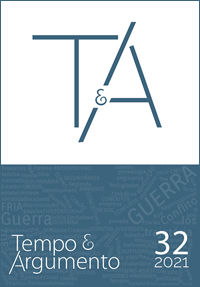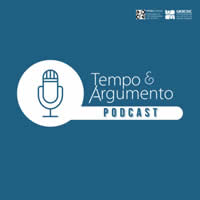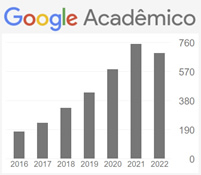Conceptual breaches of security and environment in the Anthropocene: the security nexuses in formation since the post cold war
DOI:
https://doi.org/10.5965/2175180313322021e0109Abstract
The Anthropocene model refers to disturbances on the earth's surface caused by intense human activity. Being associated with a new interval in the geological history of the Earth, it has been approached by several areas of knowledge of the so-called Earth sciences, reaching now to the social sciences and humanities, since its implantation. International Relations (IR) seek a better specificity of their functions vis-à-vis the Anthropocene, expanding their field of action. In the field of Security, it is stated that the actors are more connected and committed to each other and that the meaning of Security based on the state actor and in the political and military sectors no longer makes sense in the anthropocentric model and that transdisciplinarity (for the discipline of international relations and beyond) must be affirmed. Collaborating with a manifesto launched at a conference sponsored by the Millennium Journal, of the London School of Economics, we bring the post-Cold War time cut to broaden the socio-environmental debate in transdisciplinary terms to the field of security studies. The Anthropocene foreshadows a time of insecurity. Although attention to security as a threat has grown in the past two decades in a frank stimulus to the post-Cold War debate and securitization is visible in the global system, a large number of security nexuses in transdisciplinary construction persist that deserve critical review in the face of phenomenon of environmental degradation created within the conceptual Anthropocene, which advocates a bipolar human-nature threat
Downloads
References
ACSELRAD, Henri. Ambientalização das lutas sociais: o caso do movimento por justiça ambiental. Estudos Avançados, São Paulo, v. 24, n. 68, p. 103-119, 2010.
ADERALDO, Vanda. A Escola Superior de Guerra: um estudo de currículos e programas. Dissertação de Mestrado. Instituto Universitário de Pesquisas do Rio de Janeiro, 1978. Mimeografado.
ANDRADE JÚNIOR, Hermes. Autoethnography (military, environment) as transdisciplinarization in Anthropocene times. Cultural Studies↔Critical Methodologies, Champaign, p. 1-13, 2020.
ANDRADE JÚNIOR, Hermes. Segurança e proteção da Amazônia em tempos de crise e escassez: um estudo de caso / security and protection of the Amazon in time of crisis and shortage: a case study. Revista de Direito da Cidade, Rio de Janeiro, v. 10, n. 3, p. 1380-1421, 2018.
ARAÚJO, Ernesto. Intervenção do Ministro Ernesto Araújo na VIII Reunião do Corredor Rodoviário Bioceânico. In: DISCURSOS. Campo Grande: Itamaraty, 22 ago. 2019. Disponível em http://www.itamaraty.gov.br/pt-BR/discursos-artigos-eentrevistas-categoria/ministro-das-relacoes-exteriores-discursos/20764-intervencaodo-ministro-ernesto-araujo-na-viii-reuniao-do-corredor-rodoviario-bioceanico-campogrande-ms-em-22-de-agosto-de-2019. Acesso em: 10 set. 2019.
BALDWIN, David A. The concept of security. Review of International Studies, Cambridge, v. 23, n.1, p. 5-26, 1997.
BARNETT, Jon. The meaning of environmental security: ecological politics and policy in the new security era. London: Zed Books, 2001.
BECKER, Bertha K. A (des)ordem global, o desenvolvimento sustentável e a Amazônia. In: BECKER, Bertha K. (org.). Geografia e meio ambiente no Brasil. 2. ed. São Paulo: Annablume: Hucitec, 1998. p. 46-64.
BECKER, Bertha K. Estado, nação e região no final do século XX. In: A AMAZÔNIA E A CRISE DA MODERNIZAÇÃO. Belém-PA: MPEG, 1994. p. 103-109.
BELCHER, Oliver; SCHMIDT, Jeremy. Being earthbound: Arendt, process and alienation in the Anthropocene. Environment and Planning D: Society and Space, Santa Barbara, v. 39, n. 1, p. 103-120, 2021.
BIGO, Didier. Globalized (in)security: the field and the ban-opticon. In: SAKAI, Naoki; SOLOMON, Jon (eds.). Translation, biopolitics, colonial difference: Aberdeen. Hong Kong: University of Hong Kong Press, 2006a. p. 109-156.
BIGO, Didier. Internal and external aspects of security. European Security, London, v. 15 n. 4, p. 385- 404, 2006b.
BONNEUIL, Christophe; FRESSOZ, Jean-Baptiste. The shock of the Anthropocene. London: Verso Books, 2016.
BOOTH, Ken. Critical security studies and world politics. Boulder: Lynne Rienner Publishers, 2005.
BRANDÃO, Ana Paula. The internal-external nexus in the security narrative of the European Union. JANUS.NET, Lisboa, v. 6 n. 1, 2015. Disponível em: http://observare.ual.pt/janus.net/en/previous-issues/327-vol-6,-n-1-may-october-2015. Acesso em: 13 dez 20.
BRANDÃO, Ana Paula. Vinte anos depois: mapeando o quadro teórico e a agenda de investigação dos Estudos de Segurança". In: CONGRESSO OBSERVARE “TENDÊNCIAS INTERNACIONAIS E POSIÇÃO DE PORTUGAL, 1., 2011, Lisboa. Actas [...]. Lisboa: OBSERVARE, 2011. p. 01-18.
BRASIL. Lei 785 da República Federativa do Brasil, de 20 Ago 1949. Cria a Escola Superior de Guerra. [Brasília: Presidência da República, 1949].
BROCK, Lothar. Security through defending the environment: an illusion? In: Elise BOULDING (ed.), New Agendas for Peace Research: conflict and security reexamined, Boulder: Lynne Rienner, 1992. p. 79-102.
BULLA, Beatriz; LEOPOLDO, Ricardo; GIRARDI, Giovana; BERALDO, Paulo. Macron rebate Bolsonaro: não é questão de lobby, queremos ajudar futuro da Amazônia. O Estado de S. Paulo, São Paulo, 24 set. 2019. Disponível em: https://politica.estadao.com.br/noticias/geral/macron-rebate-bolsonaro-nao-e-questao-de-lobby-queremos-ajudar-futuro-da-amazonia,70003022952. Acesso em: 11 nov. 2019.
BURKE, Anthony et al. Planet politics: a manifesto from the end of IR. Millennium, London, v. 44, n. 3, p. 499-523, 2016.
BUZAN, Barry; HANSEN, Lene. The evolution of international security studies. Cambridge: Cambridge University Press, 2009.
BUZAN, Barry; WÆVER, Ole. Regions and powers: the structure of international security. Cambridge: Cambridge University Press, 2003.
BUZAN, Barry; WÆVER, Ole; WILDE, Jaap. Security: a new framework for analysis. Boulder: Lynne Rienner Publishers, 1998.
BUZAN, Barry. Peace, power, and security: contending concepts in the study of International Relations. Journal of Peace Research, Oslo, v. 21, n. 2, p. 109-125, 1984.
BUZAN, Barry. People, states and fear: an agenda for international security studies in post Cold War era. New York: Harvester and Wheatsheaf, 1991.
BYERS, Bruce. Ecoregions, state sovereignty and conflict. Bulleting of Peace Proposals, Oslo, v. 22, n.1, p. 65-76, 1991.
COLLINS, Alan. Contemporary security studies. 4. ed. Oxford: Oxford University Press, 2016.
CONCA, Ken. Rethinking the Ecology- Sovereignty Debate. Millennium, Journal of International Studies, London, v. 23, n.3, p. 701-711, 1994.
CRUTZEN, Paul. Geology of mankind. Nature, London, v. 415, n. 23, p. 23, 2002. DOI: 10.1038/415023a. Disponível em: htttps://doi.org/10.1038/415023a. Acesso em: 24 abr. 2021.
CRUTZEN, Paul; STOERMER, Eugene. The Anthropocene. IGBP Global Change Newsletter, Stockholm, n. 41, p. 17-18, 2000.
DABELKO, Geoffrey; LONERGAN, Steve; MATTHEW, Richard. State-of-the-art review on environment, security and development co-operation. [S.l.]: IUCN/OECD, 2002. Disponível em: http://www.iisd. org/pdf/2002/envsec_oecd_review.pdf. Acesso em: 24 abr. 2021.
DALBY, Simon. Climate change. The RUSI Journal, London, v. 158, n. 3, p. 34-43, 2013.
DALBY, Simon. Rethinking security: ambiguities in policy and theory. Camberra: Peace Research Center, 1991.
DE FREITAS, Elizabete. Science studies and the metamorphic multiple Earth: Bruno Latour’s risky diplomacy. Cultural Studies ↔ Critical Methodologies, Champaign, v. 20, n. 3, p. 203-212, 2019.
DER DERIAN, James. A reinterpretation of realism: genealogy, semiology, dromology. In: DER DERIAN, James (ed.). International relations theory: critical investigations. Houndmills: MacMillan, 1995. p. 363-396.
DREIFUSS, René Armand. 1964: A conquista do Estado: ação política, poder e golpe de classe. Petrópolis; Rio de Janeiro: Vozes, 1981. 814p.
ECKERSLEY, Robin. Environmentalism and political theory: toward an ecocentric approach. Nova Iorque: State University of New York Press, 1992.
FARIA, Mariana, GIOVANELLA, Ligia; BERMUDEZ, Luana. A Unasul na assembleia mundial da saúde: posicionamentos comuns do conselho de saúde Sul-Americano. Saúde em Debate [online], Rio de Janeiro, v. 39, n. 107, p. 920-934, 2015. DOI: 10.1590/0103-110420151070230. Disponível em: http://www.scielo.br/scielo.php?script=sci_arttext&pid=S0103-11042015000400920&lng=pt&nrm=iso. Acesso em: 24 abr. 2021. https://doi.org/10.1590/0103-110420151070230.
FARHI NETO, Leon. Concepções filosóficas ambientalistas: uma análise das diferentes perspectivas. ethic@-An international Journal for Moral Philosophy, Florianópolis, v. 5, n. 3, p. 33-56, 2006.
FORTI NETO, Octávio. Da UNASUL para o PROSUL: a visão do estado de direito e o regionalismo latino-americano. Conjuntura Global, Curitiba, v. 9, n. 1, p.130-149, 2020.
FERREIRA, Leila. A questão ambiental: sustentabilidade e políticas públicas no Brasil. São Paulo: Ed. Boitempo, 1998.
FISCHER, Dietrich. Nonmilitary aspects of security: a systems approach: Aldershot. Dartmouth: UNIDIR, 1993.
FLEMES, Daniel et al. Una comunidad de seguridad regional en formación: la UNASUR y su Consejo de Defensa. Estudios Internacionales, Santiago del Chile, n. 170, p. 105-27, 2011.
FUCCILLE, Alexandre; REZENDE, Lucas Pereira. Complexo regional de segurança da América do Sul: uma nova perspectiva. Contexto Internacional, Rio de Janeiro, v. 35, n. 1, p. 77-104, 2013.
GARCIA, Francisco Proença. As ameaças trasnacionais e a segurança dos estados: subsídios para o seu estudo. Revista Negócios Estrangeiros, Lisboa: Ministério dos Negócios Estrangeiros – Instituto Diplomático, n. 9.1, p. 339-374, mar. 2006.
HAMMERSTAD, Anne. Whose security?: UNHCR, refugee protection and state security after the Cold War. Security Dialogue, Oslo, v. 31, n. 4, p. 391-403, 2000.
HOLLING, Crawford. Resilience and stability of ecological systems. Annual Review of Ecological Systems, Palo Alto, n. 4, p. 1-24, 1973.
HOUGH, Peter. Environmental security: an introduction. London: Routledge, 2014.
JONAS, Hans. El principio de responsabilidad: ensayo de una ética para la civilización tecnológica. Barcelona: Editoral Herder, 1995.
LEFF, Enrique. História ambiental. In: Saber Ambiental: sustentabilidade, racionalidade, complexidade, poder. Tradução de Lúcia Mathilde Endlich Orth. Petrópolis: Vozes, 2001. p. 385-402.
LEFF, Enrique. La complejidad ambiental. Ciudad del Mexico.: Siglo XXI Editores, 2000.
LIMA, Rosirene Martins; SHIRAISHI, Joaquim Neto. Conflitos socioambientais: o direito ambiental como legitimador da atuação do Estado no Jardim Icaraí, Curitiba. Ambient. soc., São Paulo, v. 18, n. 2, p. 129-144, jun. 2015.
LIPSCHULTZ, Ronnie. On security. New York: Columbia University Press, 1995.
LUZURIAGA, Fernández; GONZÁLEZ, H. Olmedo. Conflictividad y órdenes mundiales: la paz de Westfalia y la inauguración del sistema internacional contemporáneo. Critica Contemporánea. Revista de Teoría Política [en línea], Montevideo, n. 8, p. 48-75, 2018. Disponivel em: https://hdl.handle.net/20.500.12008/21106. Acesso em: 24 abr. 2021.
MAOZ, Zee; RUSSETT, Bruce. Normative and structural causes of democratic peace, 1946-1986, American Political Science Review, Washington, v. 87, n. 3, p. 624-638, 1993.
MAOZ, Zeev. Domestic sources of global change. Ann Harbor: University of Michigan Press, 1996.
MARCHESAN, Ana Maria Moreira. O fato consumado em matéria ambiental. Salvador: JusPodvim, 2019.
MARTINELLI, Caio Barbosa. O jogo tridimensional: o hard power, o soft power e a interdependência complexa, segundo Joseph Nye. Conjuntura Global, Curitiba, v. 5, n. 1, p.65-80, 2016.
MATHIAS, Suzeley Kalil. A militarização da burocracia: a participação militar na administração federal das comunicaçőes e da educação, 1963-1990. Unesp, 2003.
MORIN, Edgar. A educação e a complexidade do ser e do saber. Rio de Janeiro: Vozes, 2010.
MOSLEY, Stephen. Common ground: integrating social and environmental history. Journal of Social History, Baltimore, v. 39, n. 3, p. 915-933, 2006.
NATO. Environment – NATO's stake. [S.l.], 2014. Disponível em: http://www.nato.int/cps/en/natohq/topics_91048.htm. Access on: 24 abr. 2021
NERY, Tiago. UNASUL: a dimensão política do novo regionalismo sul-americano. Cad. CRH, Salvador, v. 29, p. 59-75, 2016. Número Especial, 3.
NICOLESCU, Basarab et al. Educação e transdisciplinaridade I. Brasília: Unesco, 2000.
O’RIORDAN, Timothy; RAYNER, Steve. Risk management for global environmental change. Global Environmental Change, [s.l.], v.1, n. 2, p. 91-108, 1991.
OLDFIELD, Frank et al. The Anthropocene review: its significance, implications and the rationale for a new transdisciplinary journal. The Anthropocene Review, [s.l.], v. 1, n. 1, p. 3-7, 2013.
PRINS, Gwyn. Notes towards the definition of global security: global security programme. Occasional Paper 6. Cambridge: University of Cambridge, 1994.
RENNER, Michael. Assessing the military’s war on the environment. In: State of the World. New York: L. Brown, 1991. p. 132-152.
SANTOS NETO, Elydio. Por uma educação transpessoal: a ação pedagógica e o pensamento de Stanislav Grof. Rio de Janeiro: Lucerna, 2006.
SANTOS, Maria Helena de Castro. A nova missão das forças armadas Latino-Americanas no mundo pós-Guerra Fria: o caso do Brasil. Rev. bras. Ci. Soc., São Paulo, v. 19, n. 54, p. 115-128, 2004.
SARAIVA, Miriam Gomes; SILVA, Álvaro Vicente Costa. Ideologia e pragmatismo na política externa de Jair Bolsonaro. Relações Internacionais, Lisboa, n. 64, p. 117-137, 2019.
SEMERARO, Giovanni. Intelectuais "orgânicos" em tempos de pós-modernidade. Cad. CEDES, Campinas, v. 26, n. 70, p. 373-391, Dic. 2006. Disponível em: http://www.scielo.br/scielo.php?script=sci_arttext&pid=S0101-32622006000300006&lng=en&nrm=iso. Acesso em: 25 abr. 2021. https://doi.org/10.1590/S0101-32622006000300006.
STEFFEN, Will et al. The trajectory of the anthropocene: the great acceleration. Anthropocene Review, [s.l.], v. 2 n.1, p. 81-98, 2015.
TANNO, Grace. A contribuição da escola de Copenhague aos estudos de segurança internacional. Contexto int., Rio de Janeiro, v. 25, n. 1, p. 47-80, 2003.
TAVOLARO, Sérgio Barreira de Faria. Movimento ambientalista e modernidade: sociabilidade, risco e moral. São Paulo: Annablume: FAPESP, 2001.
THIRY-CHERQUES, Hermano Roberto. Pierre Bourdieu: a teoria na prática. Rev. Adm. Pública, Rio de Janeiro, v. 40, n. 1, p. 27-53, 2006.
THOMAS, Caroline. The Third World security. In: CAREY, Roger; SALMON, Trevor C. (eds). International security in the modern world. New York: St. Martin’s Press, 1992.
UGARTE, José Manuel. Los conceptos de defensa y seguridad en América Latina: sus peculiaridades respecto de los vigentes en otras regiones, y las consecuencias políticas de tales peculiaridades. Washigton: Lasa, 2001.
UNITED NATIONS HIGH-LEVEL PANEL ON THREATS, CHALLENGES AND CHANGE. A more secure world: our shared responsibility, New York: United Nations. Terrorism [s.l.], v.145, n. 164, p. 41, 2004.
UNITED NATIONS SECURITY COUNCIL. Press release: Security Council holds first-ever debate on impact of climate change on peace, security, hearing over 50 speakers, 2007. [s.l.], 2007. Disponível em: http://www.un.org/press/en/2007/sc9000.doc.htm. Acesso em: 24 abr. 2021
VAYRYNEN, Raimo. Concepts of security revisited (Book Review). Mershon International Studies Review, Oxford, v. 39, p. 259-262, 1995. Supplement, 2.
VILLA, Rafael Duarte. A segurança global multidimensional. Lua Nova: Revista de Cultura e Política, São Paulo, n. 46, p. 99-118, 1999.
VILLANUEVA Ayón, Miriam. La seguridad humana: ¿una ampliación del concepto de seguridad global?, Argentina Global, Buenos Aires, n. 3, p.106-130, 2000.
VIÑUALES, Jorge E. Law and the Anthropocene. C-EENRG Working Paper, Rochester, v. 4, 2016. Disponível em: https://ssrn.com/abstract=2842546. Acesso em: 24 abr.2021
WAEVER, Ole et al. Identity, migration and the new security agenda in Europe. London: Pinter, 1993.
WATERS, Collin et al. The Anthropocene is functionally and stratigraphically distinct from the Holocene. Science, Washington, v. 351, n. 6269, aad2622, 2016.
DOI: 10.1126/science.aad2622.
WCED. Our common future: report by the world commission on environmental and development. New York: Oxford University Press, 1987.
WESTING, Arthur. The environmental component of comprehensive security. Bulletin of Peace Proposals, Oslo, v. 20, n. 2, p. 129-134, 1989.
WICKSON, Fern et al. Transdisciplinary research: characteristics, quandaries and quality. Futures, [s.l.], v. 38, n. 9, p.1046-1059, 2006.
ZALASIEWICZ, Jan et al. Scale and diversity of the physical technosphere: a geological perspective. The Anthropocene Review, [s.l.], p. 1-14, 2016.
Downloads
Published
How to Cite
Issue
Section
License
Copyright (c) 2021 Tempo e Argumento

This work is licensed under a Creative Commons Attribution-NonCommercial 4.0 International License.
The articles published by the magazine are for free use, destined for educational purposes and not commercial. The copyrights are all granted to the magazine. The articles whose authors are identified represent the expressed opinion of its authors and not the official position of the Tempo e Argumento magazine or of the Postgraduate Program in History of the Universidade do Estado de Santa Catarina.




